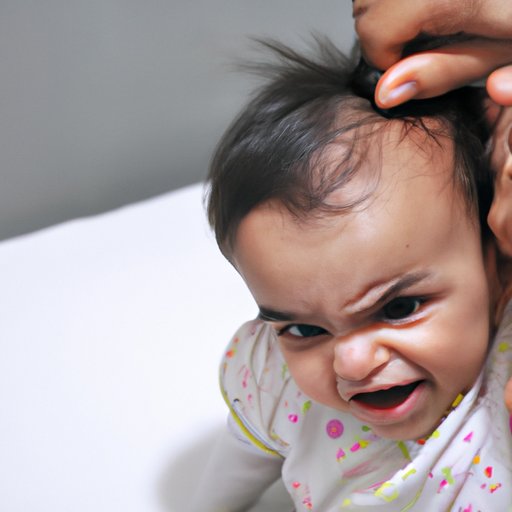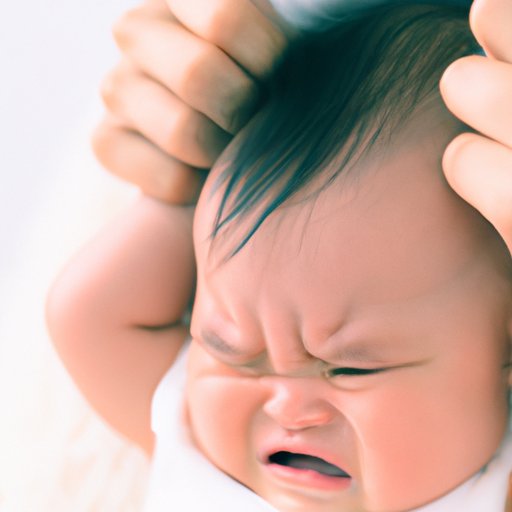Introduction
Hair pulling in babies is a common behavior that can cause concern for parents. While it may look like your baby is trying to hurt themselves, this behavior is often a sign of distress and can be linked to their development. In this article, we will explore why do babies pull their hair so that you can gain a better understanding of this behavior and what you can do to help your baby.

Exploring the Developmental Reasons Behind Hair Pulling in Babies
As babies grow and develop, they are constantly learning new things about their environment and how to interact with it. Understanding why your baby pulls their hair requires looking at their development in three key areas: physical, cognitive, and emotional.
Physical Development
Babies are born without the motor skills needed to do much more than move their limbs around and grab objects. As they get older, they learn to control their movements more precisely, which can include grabbing onto their own hair. This can be an interesting sensation for them as they explore their bodies, particularly if their hair is long enough for them to easily grab onto.
Cognitive Development
The brain of a baby is rapidly developing during the first year of life. During this time, babies are learning about the world around them and how to interact with it. As their cognition develops, they may start to experiment with different behaviors, such as hair pulling, in order to understand how it feels or what the consequences are.
Emotional Development
Babies also have to learn how to regulate their emotions. This is a difficult task for even adults, and babies are still learning how to express their feelings appropriately. Hair pulling can be a way for them to express their emotions, whether they are feeling overwhelmed, frustrated, or anxious.

Investigating the Causes of Hair Pulling in Infants
Once you understand the developmental reasons behind why babies pull their hair, it’s important to investigate the underlying causes. Here are some of the most common triggers for hair pulling in infants:
Stress and Anxiety
Babies are not immune to stress and anxiety, and these feelings can manifest as hair pulling. If your baby is going through a stressful transition, such as starting daycare or being away from home for the first time, they may resort to hair pulling as a way to cope.
Boredom
Just like adults, babies can become bored and need something to occupy their time. Hair pulling can be one way for them to pass the time, especially if they don’t have any other toys or activities available to keep them occupied.
Sensory Seeking
Some babies may pull their hair for the sensory stimulation it provides. The feeling of the hair being pulled can provide a calming sensation, similar to when an adult rubs their temples or scalp.

Hair Pulling in Babies: When to be Concerned
While hair pulling is often a normal part of a baby’s development, there are certain signs that could indicate a deeper issue. If you notice any of the following signs, it may be time to seek professional help:
Signs of Stress
If your baby is pulling their hair while also showing signs of stress, such as excessive crying or fussiness, it could be an indication of a deeper problem. Be sure to pay attention to your baby’s behavior and look for patterns that could point to a bigger issue.
Excessive Hair Loss
Hair loss is normal for babies, but if you notice bald patches or thinning hair it could be a sign that your baby is pulling too hard or too frequently. If this is the case, you should talk to your doctor to determine the best course of action.
Understanding Hair Pulling in Babies: Is It Normal?
Hair pulling in babies is usually a normal part of their development, but it can sometimes be a sign of distress. Understanding the developmental reasons behind hair pulling can help you decide when to be concerned and when it’s ok to let your baby continue exploring their environment.
Normal Development
As your baby grows and develops, they may start to experiment with their environment and explore different sensations. Hair pulling is a normal behavior for babies and can be a way for them to explore their bodies and the world around them.
When to Seek Professional Help
If your baby is displaying signs of distress, such as excessive crying or fussiness, or you notice hair loss or bald patches, it may be time to seek professional help. Your doctor can help you determine the underlying cause of your baby’s hair pulling and provide guidance on how to address the issue.
Examining the Link Between Hair Pulling and Stress in Babies
Babies are not immune to stress and anxiety, and hair pulling can be a sign of distress. Understanding the stressors in babies and how to help them cope can be an effective way to prevent hair pulling.
Stressors in Babies
Babies can experience stress just like adults, and it can be triggered by a variety of things. Some common stressors in babies include separation anxiety, changes in routine, overstimulation, hunger, and fatigue.
Coping Mechanisms
Helping your baby learn how to cope with their stress and anxiety is an important part of parenting. There are several ways to help your baby self-soothe and reduce stress, such as providing comfort items, singing lullabies, or engaging in quiet activities together.
The Comfort Factor: How Hair Pulling Helps Babies Self-Soothe
Hair pulling can provide a calming sensation for babies, similar to when an adult rubs their temples or scalp. However, if your baby is pulling too hard or too frequently, it can cause hair loss or bald patches. To avoid this, it’s important to understand why your baby is pulling their hair and provide alternative ways for them to self-soothe.
Calming Benefits
Hair pulling can provide a calming sensation for babies, and some babies may find it comforting. It can also be a way for them to express their emotions and relieve stress. However, it’s important to remember that hair pulling can cause hair loss and should not be encouraged.
Alternatives to Hair Pulling
There are several alternatives to hair pulling that can provide the same calming benefits. These include providing comfort items, such as a stuffed animal or blanket, singing lullabies, or engaging in quiet activities together. Finding the right combination of soothing activities can help your baby relax and reduce their stress.
Conclusion
Hair pulling in babies is a common behavior that is often a sign of distress. Understanding the developmental reasons behind hair pulling, the causes, and when to be concerned can help you gain a better understanding of this behavior and what you can do to help your baby. Hair pulling can provide a calming sensation for babies, but it can also cause hair loss. Knowing the alternatives to hair pulling can help you provide comfort and self-soothing for your baby without causing any harm.
If you are concerned about your baby’s hair pulling, it is important to speak to your doctor or pediatrician. They can help you determine the underlying cause of your baby’s hair pulling and provide guidance on how to address the issue.


